Preventing Future Attacks with Ongoing Gout Treatment
Gout is a type of arthritis that results from the buildup of uric acid crystals in the joints. It is characterized by sudden and severe attacks of pain, swelling, and redness in the affected joint, which usually occurs in the big toe, but can also occur in other joints such as the ankle, knee, elbow, wrist, or fingers. It occurs when there is an excess of uric acid in the blood, which can be caused by a variety of factors, including genetics, obesity, a diet high in purines, alcohol consumption, and certain medications.
Treatment typically involves managing the pain and inflammation associated with an acute attack, as well as addressing the underlying causes of the condition. This may involve taking medications such as nonsteroidal anti-inflammatory drugs (NSAIDs), colchicine, or corticosteroids, as well as making lifestyle changes such as losing weight, avoiding high-purine foods, and reducing alcohol intake. If left untreated, gout can lead to complications such as joint damage, kidney stones, and chronic kidney disease. It is important to seek medical attention if you suspect you may have gout or are experiencing symptoms of an acute attack. We will discuss the following topics:
Causes of gout
Symptoms of gout
Foods that cause gout
Gout triggers
Complications of gout
Diagnosis of gout
Pseudogout
Management of gout
Medications to prevent future attacks
Gout surgery
Safe food for people with gout
Herbal remedies
Gout prevention
Myths and facts regarding gout
When to seek urgent medical care
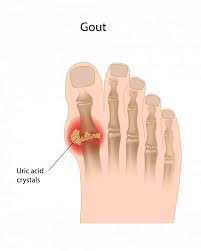
Uric acid
Uric acid is a substance that is naturally produced by our bodies when we eat foods that contain something called “purines.”
When our body breaks down purines, it creates uric acid, which is then carried in our blood to our kidneys and then passed out of our body when we go to the bathroom.
Sometimes, if there is too much uric acid in our blood, it can form tiny crystals in our joints, which can cause pain and swelling. This is called gout, and it can happen to grown-ups if they eat too much of certain types of foods.
Purines
Purines are tiny little substances that are found in certain types of food, like meat, fish, and some vegetables.
When we eat these foods, our body breaks down the purines and turns them into something called uric acid, which is then passed out of our body when we go to the bathroom.
So, purines are just a part of the foods that we eat, and they help our body make uric acid.
Causes of gout
The following are some common causes:
Genetics: Gout can be hereditary, meaning it runs in families. If someone in your family has gout, you may be at an increased risk of developing the condition.
Diet: Certain foods can trigger attacks. These include red meat, shellfish, organ meats, sugary drinks, and foods high in fructose.
Alcohol: Drinking alcohol, particularly beer, can increase the risk. Alcohol can also interfere with the body’s ability to eliminate uric acid.
Medical conditions: Certain medical conditions such as high blood pressure, diabetes, and kidney disease can increase the risk.
Medications: Certain medications such as diuretics, aspirin, and some chemotherapy drugs can increase uric acid levels in the body, which can trigger attacks.
Obesity: Being overweight or obese can increase the risk as excess weight can increase uric acid production in the body.
Dehydration: Dehydration can cause uric acid to build up in the body, increasing the risk of attacks.
Which foods cause gout
Certain foods can trigger attacks by increasing the levels of uric acid in the body.
Red meat: Beef, lamb, and pork are high in purines, which can be broken down into uric acid in the body.
Seafood: Shellfish, including shrimp, crab, and lobster, are high in purines and can increase uric acid levels in the body.
Organ meats: Liver, kidney, and other organ meats are high in purines and can increase uric acid levels in the body.
Sugary drinks: Soda, fruit juices, and other sugary drinks are high in fructose, which can increase uric acid levels in the body.
Alcohol: Beer, wine, and liquor can increase uric acid levels in the body, making it more likely for gout attacks to occur.
High-fructose corn syrup: This sweetener is often found in processed foods, baked goods, and other sugary snacks and can increase uric acid levels.
It’s important to note that not everyone who consumes these foods will develop gout, and not everyone who has gout has high uric acid levels due to their diet. However, if you have gout, it’s important to avoid these trigger foods and maintain a healthy diet to reduce the frequency and severity of gout attacks.
Gout triggers
Here are some common triggers:
Alcohol: Drinking alcohol, particularly beer, can increase the risk of attacks. It can increase the production of uric acid in the body and decrease the excretion of uric acid from the kidneys, leading to a buildup of uric acid in the body. Beer, in particular, has been shown to increase the risk of gout attacks due to its high purine content and the fact that it can increase uric acid production.
Surgery or injury: Surgery or injury can cause inflammation in the body, which can trigger a gout attack.
Stress: Stress can increase uric acid levels in the body, triggering gout attacks.
Illness: Certain illnesses such as infections and fever can trigger gout attacks.
Gender and age: It is more common in men than women, and it often develops in men between the ages of 30 and 50. Women are more likely to develop gout after menopause.
Genetics: Gout can be hereditary, meaning it runs in families. If someone in your family has gout, you may be at an increased risk of developing the condition.
Diet: Certain foods can trigger gout attacks, including red meat, shellfish, organ meats, sugary drinks, and foods high in fructose.
Medical conditions: Certain medical conditions such as high blood pressure, diabetes, and kidney disease can increase the risk of gout.
Medications: Certain medications such as diuretics, aspirin, and some chemotherapy drugs can increase uric acid levels in the body, which can trigger gout attacks.
Obesity: Being overweight or obese can increase the risk of gout as excess weight can increase uric acid production in the body.
Dehydration: Dehydration can cause uric acid to build up in the body, increasing the risk of gout attacks.
Symptoms of gout
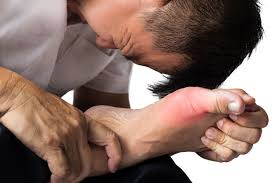
Sudden and intense pain: Gout often causes sudden and intense pain in the affected joint. The pain is usually described as a sharp or burning sensation.
Swelling, warmth and redness: The affected joint may become swollen, warm, tender, and red. The skin around the joint may also feel warm.
Limited range of motion: Gout can make it difficult to move the affected joint due to the pain and swelling.
Stiffness: Gout can cause stiffness in the affected joint, making it difficult to move or use.
Tophi: Over time, gout can cause the formation of tophi, which are small, visible and firm lumps under the skin around the affected joint.
Gout most commonly affects the big toe, but it can also occur in other joints such as the ankle, knee, wrist, and elbow. Gout attacks can last for several days or weeks and can be recurrent if not properly managed. If you’re experiencing any of these symptoms, it’s important to speak with a healthcare professional to determine the underlying cause and receive appropriate treatment.
How long does a gout attack last?
The duration of an attack can vary depending on the individual and the severity of the attack. Typically, an attack lasts anywhere from a few days to a couple of weeks. During the attack, the affected joint may be swollen, red, and extremely painful. The pain may be severe enough to interfere with daily activities such as walking or standing. As the attack progresses, the pain may gradually subside, and the joint may start to feel better. However, without proper treatment, gout attacks may become more frequent and severe over time. It’s important to seek medical attention if you’re experiencing a gout attack or have a history of gout to receive appropriate treatment and prevent future attacks.
Complications of gout
If left untreated, it can lead to several complications that can affect the joints and other parts of the body. Here are some of the potential complications:
Joint damage: Over time, gout attacks can cause damage to the joints, leading to chronic pain, stiffness, and loss of mobility.
Tophi: Tophi are small, firm lumps that can form under the skin around the joint. They are caused by the build-up of uric acid crystals and can become painful and disfiguring.
Kidney stones: Uric acid crystals can also form in the kidneys, leading to the formation of kidney stones. Kidney stones can cause severe pain, nausea, and difficulty urinating.
Kidney damage: The build-up of uric acid in the kidneys can lead to kidney damage or failure if left untreated.
Cardiovascular disease: Gout has been associated with an increased risk of cardiovascular disease, including heart attacks and strokes.
Diabetes: Gout has also been linked to an increased risk of developing diabetes.
It’s important to seek medical attention if you’re experiencing gout symptoms or have a history of gout to receive appropriate treatment and prevent potential complications. With proper management and lifestyle changes, it is possible to reduce the risk of complications.
Diagnosis of gout

To diagnose the condition, a healthcare professional will usually begin by taking a medical history and performing a physical examination. During the examination, the healthcare professional will look for signs of inflammation such as redness, warmth, and swelling around the affected joint.
In addition to the physical examination, the healthcare professional may also order the following tests:
Joint fluid analysis: A sample of fluid from the affected joint is taken and examined for the presence of uric acid crystals.
Blood test: A blood test can measure the level of uric acid in the blood. However, it’s important to note that high levels of uric acid do not always indicate gout, and some people may have normal uric acid levels.
Imaging tests: X-rays or other imaging tests may be ordered to check for joint damage or other conditions that may be causing the symptoms.
If gout is diagnosed, the healthcare professional will work with the patient to develop a treatment plan to manage the symptoms and prevent future attacks. Treatment may include medications such as nonsteroidal anti-inflammatory drugs (NSAIDs), colchicine, or corticosteroids, as well as lifestyle changes such as dietary modifications and weight loss.
Pseudogout
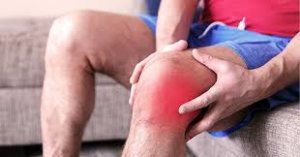
Pseudogout, also known as calcium pyrophosphate deposition disease (CPPD), is a type of arthritis that is caused by the build-up of calcium pyrophosphate crystals in the joints. Pseudogout can cause symptoms similar to gout, including sudden and severe joint pain, swelling, and redness. However, unlike gout, which is caused by the build-up of uric acid crystals, pseudogout is caused by the build-up of calcium pyrophosphate crystals. Pseudogout most commonly affects the knees, but it can also affect other joints such as the wrists, ankles, and elbows. The symptoms can be sudden and severe, but they can also be chronic and progressive over time. The symptoms may also mimic those of other forms of arthritis, making it difficult to diagnose.
Management of gout

Stay hydrated: Drinking plenty of water can help flush out uric acid and reduce the risk of attacks.
Avoid trigger foods: Certain foods can trigger attacks, such as red meat, seafood, and alcohol. Limiting or avoiding these foods can help reduce the frequency of attacks.
Apply ice: Applying ice to the affected joint can help reduce pain and inflammation during an acute attack.
Elevate the affected joint: Elevating the affected joint can help reduce swelling and improve circulation.
Exercise regularly: Regular exercise can help maintain a healthy weight and reduce the risk of attacks.
Medications:
- Nonsteroidal anti-inflammatory drugs (NSAIDs) such as ibuprofen and naproxen can help relieve pain and reduce inflammation.
- Colchicine is a medication that can help reduce pain and inflammation during an acute attack.
- Corticosteroids such as prednisone may be prescribed to reduce inflammation and pain during an acute attack.
- Urate-lowering drugs such as allopurinol and febuxostat can help reduce the amount of uric acid in the blood and prevent future attacks. These medications are typically used for people who experience frequent attacks or have high levels of uric acid in the blood.
- Probenecid can be used to increase the excretion of uric acid in the urine.
Lifestyle changes:
- Limiting alcohol consumption, particularly beer and spirits.
- Drinking plenty of fluids, particularly water, to help flush out uric acid.
- Eating a low-purine diet that includes vegetables, low-fat dairy products, and lean protein sources such as poultry and fish while avoiding high-purine foods such as red meat, seafood, and organ meats.
- Maintaining a healthy weight and engaging in regular physical activity.
Gout surgery

Surgery is not a common treatment for gout, but it may be necessary in some cases to treat complications of the condition. Some examples of surgical procedures that may be performed to treat gout include:
Joint aspiration: This is a procedure in which a healthcare professional uses a needle to withdraw fluid from the affected joint. This can help reduce pain and inflammation during an acute attack.
Synovectomy: This is a surgical procedure in which the inflamed synovial tissue that lines the joint is removed. This can be useful for people with chronic gout who have significant joint damage.
Joint replacement: In some cases, joint damage from gout can be so severe that joint replacement surgery is necessary. This involves removing the damaged joint and replacing it with an artificial joint.
It’s important to note that surgery is generally not the first-line treatment for gout and is typically reserved for people with severe or chronic cases of the condition. The decision to undergo surgery for gout should be made in consultation with a healthcare professional, and the risks and benefits of the procedure should be carefully considered.
Safe food for people with gout
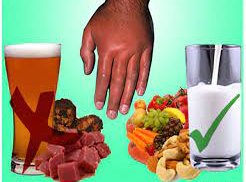
It’s important to focus on eating a healthy, balanced diet that includes plenty of whole grains, fruits, and vegetables, as well as lean sources of protein. Here are some foods that are generally safe and recommended for people with gout:
Low-fat dairy products, such as skim milk, low-fat yogurt, and cottage cheese
Complex carbohydrates, such as whole grains, brown rice, and quinoa
Fruits, especially those that are high in vitamin C, such as strawberries, oranges, and kiwi
Vegetables, especially those that are high in fiber, such as broccoli, kale, and cauliflower
Lean proteins, such as chicken, turkey, and fish (not high purine seafood such as anchovies, sardines, mackerel, scallops, and shrimp)
Nuts and seeds, such as almonds, walnuts, and chia seeds
Water, herbal tea, and low-sugar drinks such as coconut water.
Foods to avoid
It’s important to limit or avoid foods that are high in purines, as they can lead to an accumulation of uric acid in the body and increase the risk of gout attacks. Foods that are high in purines include:
Organ meats, such as liver, kidney, and sweetbreads
Seafood, such as anchovies, sardines, mackerel, scallops, and shrimp
Game meats, such as venison and duck
Some vegetables, such as asparagus, mushrooms, and spinach
Beer and other alcoholic beverages
It’s also important to limit your intake of high-fructose foods and drinks, such as soda and fruit juice, as they can increase the production of uric acid in the body.
In addition, it’s a good idea to limit your intake of high-fat foods, such as fried foods, fatty cuts of meat, and full-fat dairy products. These foods can contribute to weight gain, which is a risk factor for gout.
Herbal remedies

While there is no cure for gout, there are several remedies that can help manage symptoms and reduce the frequency of attacks. Here are some examples:
Apple cider vinegar: Apple cider vinegar has been shown to help alkalize the body and reduce uric acid levels. You can consume apple cider vinegar by adding it to water or taking it in supplement form.
Stay hydrated: Drinking plenty of water can help flush out uric acid and reduce the risk of attacks.
Turmeric: This spice contains curcumin, a compound with anti-inflammatory properties. It may help reduce inflammation and pain associated with gout.
Ginger: Ginger contains compounds that have anti-inflammatory properties, which can help reduce pain and inflammation associated with gout. You can consume ginger by adding it to meals, drinking ginger tea, or taking ginger supplements.
Devil’s claw:  This herb has been traditionally used to treat inflammatory conditions such as gout. It may help reduce pain and inflammation.
This herb has been traditionally used to treat inflammatory conditions such as gout. It may help reduce pain and inflammation.
Cherry juice: Cherries are rich in compounds called anthocyanins, which have anti-inflammatory properties. Some people believe that drinking cherry juice or eating cherries can help reduce the frequency and severity of gout attacks. While there is some evidence to support this, more research is needed to confirm its effectiveness.
Tart cherries: Some studies suggest that tart cherry juice or supplements may help reduce the frequency and severity of gout attacks by reducing inflammation and lowering uric acid levels in the blood.
Magnesium: Magnesium is an essential mineral that may help reduce inflammation and pain associated with gout. Some studies suggest that magnesium supplements may help reduce uric acid levels in the blood and improve kidney function in people with gout.
Ginger: Ginger has anti-inflammatory properties that may help reduce pain and inflammation associated with gout. Some studies suggest that ginger supplements or extracts may be effective in reducing uric acid levels and preventing attacks.
Diluted apple cider vinegar: Some people believe that apple cider vinegar may help alkalize the body and reduce uric acid levels, thereby reducing the risk of gout attacks. However, there is limited scientific evidence to support this claim.
Celery: Some studies suggest that celery may help reduce inflammation and lower uric acid levels in the blood, which may help prevent attacks.
Nettle tea:  a natural diuretic that may help flush excess uric acid from the body, reducing the risk of attacks.
a natural diuretic that may help flush excess uric acid from the body, reducing the risk of attacks.
Dandelion: Dandelion is another natural diuretic that may help reduce uric acid levels and prevent gout attacks. However, there is limited scientific evidence to support this claim.
Milk thistle seeds: 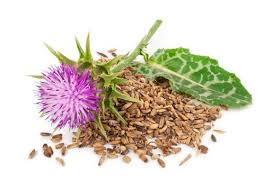 Milk thistle is a plant that is traditionally used to support liver function. Some studies suggest that milk thistle supplements may help improve liver function in people with gout, which may help reduce the risk of attacks.
Milk thistle is a plant that is traditionally used to support liver function. Some studies suggest that milk thistle supplements may help improve liver function in people with gout, which may help reduce the risk of attacks.
Chinese cinnamon: 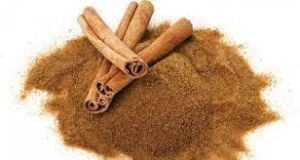 also known as cassia cinnamon, is believed to have anti-inflammatory properties that may help reduce pain and inflammation associated with gout. To use Chinese cinnamon for gout, sprinkle cinnamon powder on food, or take supplements as directed by your healthcare provider. Note that high doses of cinnamon can be toxic, so it’s important to use it in moderation and under the guidance of a healthcare provider.
also known as cassia cinnamon, is believed to have anti-inflammatory properties that may help reduce pain and inflammation associated with gout. To use Chinese cinnamon for gout, sprinkle cinnamon powder on food, or take supplements as directed by your healthcare provider. Note that high doses of cinnamon can be toxic, so it’s important to use it in moderation and under the guidance of a healthcare provider.
Here’s how essential oils can be used for gout:

Some essential oils, such as lemongrass oil, celery seed oil, yarrow oil extract, olive leaf extract, frankincense and peppermint, may have anti-inflammatory and analgesic properties that may help reduce pain and inflammation associated with gout. However, essential oils should always be used with caution and diluted properly before use, as they can be toxic if ingested or applied directly to the skin. Always dilute essential oils in a carrier oil and perform a patch test on a small area of skin before using them topically. If you experience any adverse reactions or have any concerns, consult with a healthcare provider before using essential oils for gout.
Lemongrass oil: 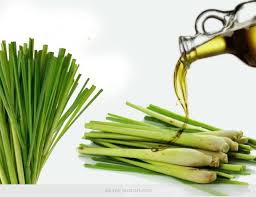 is believed to have anti-inflammatory properties that may help reduce pain and inflammation associated with gout. To use lemongrass oil for gout, dilute a few drops in a carrier oil such as coconut oil or olive oil, and massage the mixture into the affected joint.
is believed to have anti-inflammatory properties that may help reduce pain and inflammation associated with gout. To use lemongrass oil for gout, dilute a few drops in a carrier oil such as coconut oil or olive oil, and massage the mixture into the affected joint.
Celery seed oil: 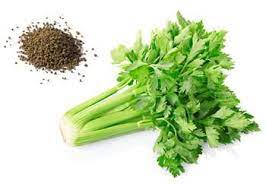 is a natural diuretic that may help flush excess uric acid from the body, reducing the risk of gout attacks. To use celery seed oil for gout, dilute a few drops in a carrier oil and massage the mixture into the affected joint, or take celery seed supplements as directed by your healthcare provider.
is a natural diuretic that may help flush excess uric acid from the body, reducing the risk of gout attacks. To use celery seed oil for gout, dilute a few drops in a carrier oil and massage the mixture into the affected joint, or take celery seed supplements as directed by your healthcare provider.
Yarrow oil extract: 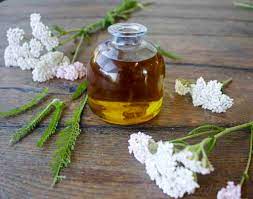 is believed to have anti-inflammatory and analgesic properties that may help reduce pain and inflammation associated with gout. To use yarrow oil extract for gout, dilute a few drops in a carrier oil and massage the mixture into the affected joint.
is believed to have anti-inflammatory and analgesic properties that may help reduce pain and inflammation associated with gout. To use yarrow oil extract for gout, dilute a few drops in a carrier oil and massage the mixture into the affected joint.
Olive leaf extract: 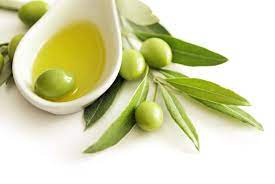 is believed to have anti-inflammatory and antioxidant properties that may help reduce inflammation and pain associated with gout. To use olive leaf extract for gout, take supplements as directed by your healthcare provider.
is believed to have anti-inflammatory and antioxidant properties that may help reduce inflammation and pain associated with gout. To use olive leaf extract for gout, take supplements as directed by your healthcare provider.
Frankincense:  is believed to have anti-inflammatory and analgesic properties that may help reduce pain and inflammation associated with gout. To use frankincense oil for gout, dilute a few drops in a carrier oil such as coconut oil or olive oil, and massage the mixture into the affected joint.
is believed to have anti-inflammatory and analgesic properties that may help reduce pain and inflammation associated with gout. To use frankincense oil for gout, dilute a few drops in a carrier oil such as coconut oil or olive oil, and massage the mixture into the affected joint.
Peppermint: 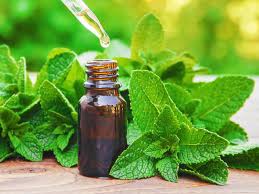 Peppermint oil is believed to have cooling and pain-relieving properties that may help reduce pain and discomfort associated with gout. To use peppermint oil for gout, dilute a few drops in a carrier oil and massage the mixture into the affected joint. Alternatively, you can add a few drops of peppermint oil to a bowl of hot water, place a towel over your head and inhale the steam for several minutes.
Peppermint oil is believed to have cooling and pain-relieving properties that may help reduce pain and discomfort associated with gout. To use peppermint oil for gout, dilute a few drops in a carrier oil and massage the mixture into the affected joint. Alternatively, you can add a few drops of peppermint oil to a bowl of hot water, place a towel over your head and inhale the steam for several minutes.
While there is some limited evidence to suggest that some of these products may have potential benefits for people with gout, it’s important to note that they should not be used as a substitute for conventional medical treatment. Always talk to your healthcare provider before using any natural remedies or supplements, as they may interact with other medications or medical conditions.
Gout prevention
There are several steps you can take to help prevent attacks:
Maintain a healthy weight: Being overweight or obese increases your risk of developing gout, so maintaining a healthy weight through a balanced diet and regular exercise is important.
Limit your intake of purine-rich foods: Foods high in purines, such as red meat, seafood, and organ meats, can increase uric acid levels and trigger attacks. Limit your intake of these foods and opt for lower-purine alternatives such as poultry, tofu, and low-fat dairy products.
Avoid or limit alcohol consumption: Alcohol can increase uric acid levels and trigger attacks. Limit your alcohol intake and avoid binge drinking.
Stay hydrated: Drinking plenty of water can help flush excess uric acid from your body, reducing the risk of gout attacks.
Take medications as prescribed: If you have a history of gout or have been prescribed medications to prevent gout attacks, take them as prescribed to help reduce your risk of recurrent attacks.
Manage underlying medical conditions: Certain medical conditions such as high blood pressure, diabetes, and kidney disease can increase your risk of developing gout. Managing these conditions through diet, exercise, and medications can help reduce your risk of gout.
By following these steps and working closely with your healthcare provider, you can help reduce your risk of gout attacks and manage your symptoms if you do develop gout.
Myths and facts regarding gout
Myth: It is caused by eating too much red meat.
Fact: While it’s true that red meat contains purines that can contribute to the development of gout, other factors such as genetics, obesity, alcohol consumption, and certain medical conditions can also play a role.
Myth: Only older men get gout.
Fact: It can affect people of any age, gender, or ethnicity, although it is more common in men and tends to develop after the age of 40.
Myth: Gout is not a serious condition.
Fact: It can cause severe pain, swelling, and disability, and it can also lead to complications such as joint damage and kidney problems if left untreated.
Myth: Once you develop gout, you will have it for life.
Fact: With proper treatment and lifestyle changes, many people with gout are able to manage their symptoms and prevent recurrent attacks.
Myth: Drinking cherry juice can cure gout.
Fact: While some studies suggest that cherry juice may help reduce the frequency and severity of gout attacks, there is no cure for gout. Treatment typically involves medications to manage pain and inflammation, as well as lifestyle changes to reduce the risk of recurrent attacks.
Myth: Gout only affects the big toe.
Fact: While the big toe is a common site for gout attacks, the condition can affect any joint in the body, including the ankle, knee, wrist, and fingers.
Myth: Gout is a sign of overindulgence and lack of self-control.
Fact: It is a medical condition that is caused by a combination of genetic and lifestyle factors. While certain lifestyle factors such as diet and alcohol consumption can contribute to the development of gout, it is not a sign of weakness or lack of willpower.
When to seek urgent medical care
If you have a history of gout and experience a sudden onset of severe joint pain, swelling, and redness, especially in the big toe, it may be a sign of an attack. While most attacks can be managed with home remedies and medications, there are some cases where urgent medical care may be necessary. You should seek urgent medical care if:
The pain is so severe that you cannot bear weight on the affected joint.
The joint is hot to the touch, and you have a fever or chills.
You have chest pain or shortness of breath.
You have signs of an infection, such as a high fever or redness and warmth around the affected joint.
You have kidney problems or a history of kidney disease, as gout can lead to kidney damage over time.
You are taking medications that may interact with gout medications, such as blood thinners or diuretics.
In these cases, it’s important to seek immediate medical attention from your healthcare provider or go to the nearest emergency room. They can evaluate your symptoms and provide appropriate treatment to help manage your gout and prevent complications.
Disclaimer: The information provided in this content is for general informational purposes only. It is not intended as medical or healthcare advice, diagnosis, or treatment. Always seek the advice of a qualified healthcare professional with any questions you may have regarding a medical condition or healthcare decisions.

